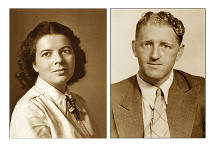

|
|
The Independent Newspaper Obituary - Colin LegumLionel Bernstein was one of a very small band of Communists who committed virtually their entire lives to fighting South Africa's harshly inequitable racial system. Whatever the final reckoning about their role in the country, one thing is certain: the Communist Party played an important part in the African National Congress's adopting the ideal of a multi-racial South Africa. As a member of the South African Labour Party, I clashed with the Communists; but I learnt to respect the integrity and single-mindedness of the taciturn Bernstein, known as "Rusty", and his equally devoted and distinguished wife, Hilda Watts. It is instructive to compare the experience and roles of the Communists in South Africa with those of the anti-Communists in the Soviet Union and Eastern Europe. Both were engaged in a seemingly hopeless struggle against ruthless regimes. Both endured long periods of imprisonment, the hardships of clandestine life and social ostracism, and the sacrifice of family life. Both closed their minds to unpleasant behaviour on the part of their allies for the sake of the wider cause. Rusty Bernstein's life embraced all these experiences. He was born into a middle-class family in Durban in 1920, one of four children of Jewish immigrant parents, who died when Rusty was eight. He was educated privately at Hilton College, and then studied architecture at the University of Witwatersrand from 1937 to 1941. He joined the then dormant South African Communist Party in his late teens. Except for a period when he served as a gunner in the South African Artillery in the Italian Campaign in the Second World War, the whole of his career, spanning 60 years, was devoted to the Party; first as a paid official, and later as a senior member of the Central Committee. When the Communist Party was banned in 1960, Bernstein helped to launch it underground. He neglected his profession of architecture, as well as the interests of a growing family. After the war, he became a founder member of the Springbok Legion, an ex-servicemen's organisation formed to campaign for democratic rights for all. He edited its publication, Fighting Talk, and wrote extensively for Communist publications. With his wife, Bernstein had been arrested for the first time in 1946, and convicted of aiding an illegal strike of black miners. Ten years later, together with 150 others (including Chief Albert Luthuli and Nelson Mandela), they were arrested and charged with treason. The trial lasted four years and ended in their acquittal. In 1960, after the Sharpeville massacre, both Rusty and Hilda were again arrested under the Emergency regulations. On their release they were banned and subjected to restrictions, including being forbidden to meet with other people. Yet more stringent restrictions followed in 1962 when Bernstein was placed under house arrest. On 11 July 1963 Bernstein, with 10 other leaders, was arrested at Lilliesleaf Farm, the headquarters of the high command of Umkhonto We Sizwe (MK), the liberation army of the ANC newly established by Nelson Mandela. Bernstein was not himself a member of the high command of MK. In his 1999 autobiography Memory Against Forgetting, he revealed for the first time that he and two other members of the CP Central Committee (Bram Fischer and Yusuf Cachalia) were initially opposed to the decision to launch an armed struggle; a decision they thought had been taken without sufficient consultation. It was typical of his independent-minded honesty that Bernstein opposed the most prominent of his colleagues, Joe Slovo, as well as Mandela. After his arrest, Bernstein was placed under 90 days' detention, and kept in solitary confinement. His minutely detailed account of this form of torture must stand as one of the most moving descriptions of the agonies of such imprisonment ever written. At the end of 90 days he was re-arrested and charged, with Mandela and nine others, in what came to be known as the Rivonia Trial. It ended with Mandela and seven others being sentenced to life imprisonment. Since there was no proof that Bernstein was involved in planning the armed struggle, he was acquitted, but threatened with re-arrest. He and his wife made a hazardous escape into exile, but without their children. Later the family was reunited in England. Bernstein worked as an architect in London for 17 years before retiring to Herefordshire and then Kidlington in Oxfordshire. He died in exile, partly because he and his wife were not prepared to be separated again from their children. Rusty Bernstein will be remembered for many reasons, and not least as drafter of the seminal Freedom Charter, which was adopted by the anti-apartheid coalition the Congress of the People in 1956. It begins with the words "Let us speak of freedom". Reprinted without the kind permission of the Independent Newspaper. Long may they forgive me. |